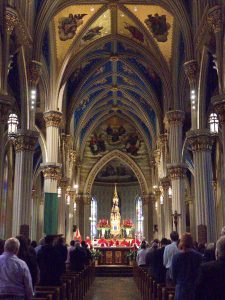October 12, 2017 // Diocese
Legal profession gathers in South Bend amid secular trends
Lawyers, judges, law professors, political scientists and students who gathered Oct. 2 for the South Bend-area’s annual Red Mass heard Bishop Kevin C. Rhoades urge them to follow the Holy Spirit despite different, secular directions taken recently in government.

The Basilica of the Sacred Heart, on the campus of the University of Notre Dame, was the location of this year’s South Bend-area Red Mass for those in the legal profession, which was celebrated Oct. 2 by Bishop Kevin C. Rhoades. — Bob List
He said preparing for the Votive Mass of the Holy Spirit, which traditionally seeks God’s blessings upon those in the legal professions, prompted him to respond to controversial remarks made on Capitol Hill in September. He also invited the Red Mass participants to receive enlightenment as witnesses for Christ amid today’s civic controversies, referring to remarks U.S. Sen. Dianne Feinstein made at a Sept. 6 hearing on the nomination of Notre Dame Law School Professor Amy Coney Barrett to serve on the U.S. Court of Appeals.
America seeks to uphold rights of conscience, and Catholics must continue to stand up for the rule of law and for just laws respecting fundamental human rights, Bishop Rhoades said. His comments came as he and his concelebrants, wearing red vestments symbolic of the Holy Spirit, focused attention on everyone’s constant need for the Spirit’s gifts.
“What would our nation be like if it was deprived of lawmakers, judges and others who act from consciences and characters inspired and shaped by faith — those who, for example, worked to abolish slavery and to promote civil rights?” he asked. He pointed to America’s founders and the Rev. Martin Luther King Jr. as examples of powerful influence grounded in faith.
Bishop Rhoades said Catholics with civic and legal duties must be able to embody their values while respecting the rule of law.
St. Thomas More, who is honored at every Red Mass as the patron of lawyers, politicians and statesmanship in general, modeled a well-formed Christian conscience in his love for country and service to just laws, Bishop Rhoades pointed out.
Ultimately, St. Thomas More was beheaded in 1535 when his conscience could not allow him to recognize King Henry VIII’s violations of God’s law in which the monarch made himself head of the Church of England.
More took a stand reflecting his openness to the Holy Spirit’s gifts of wisdom and fortitude, Bishop Rhoades pointed out. “Because of this, I would say that dogma really lived loudly within St. Thomas More — so loudly that he became a martyr.”
With More personifying the blessings and responsibilities of pursuing liberty and justice through the legal profession, as encouraged in the Red Mass, the Bishop praised the recent establishment of the St. Thomas More Society of South Bend. The group, whose counterpart in Fort Wayne has existed for several years, describes itself as a private association of the Christian faithful supporting each other and affiliated with the Diocese of Fort Wayne-South Bend.
Following the Red Mass, the recently formed St. Thomas More Society hosted a lecture by professor Stephen Smith, a Notre Dame graduate who now serves as dean of the faculty and a professor of English at Hillsdale College.
Smith called More an exemplar of the kind of “leading citizen” whose outstanding qualities yielded many years of distinguished service and impact on the England of his time, including blessings for More’s family, the law and the church, as well as the nation.
Today’s society must nurture a critical Mass of “leading citizens” characterized by trustworthiness, steadfastness and “greatness of soul” if it is to enjoy a “renaissance.” Without such citizens, Smith said, a society risks declining into meanness and even tyranny.
“The leading citizen needs to see everything as coming from our tender, loving Father.” The preparation needed for such a perspective, according to Smith, must embrace a comprehensive education comprising philosophy, history, law, theology and art.
But such a truly “liberal” education, able to liberate people for a pursuit of the good, must be accompanied by other factors to be nurtured by society, Smith said. Those factors include formation in virtue; training for wise deliberation amid complex circumstances; a sense of integrity that avoids compartmentalization of thoughts, words and deeds; a study of tyranny and how the misuse of laws can lead to it; and a willingness to suffer personally for the greater good.
Also, as if to further affirm the Red Mass tradition, invoking the Holy Spirit for an ongoing impact on a whole profession and on posterity, Smith added another factor. He said true, enduring friendships were important to sustain St. Thomas More as a leading citizen. Such friendship is crucial today too, he suggested, noting that a society’s best leaders deserve the strong support of others.
The best news. Delivered to your inbox.
Subscribe to our mailing list today.






